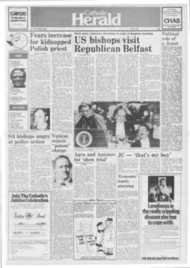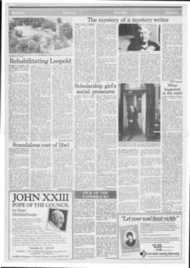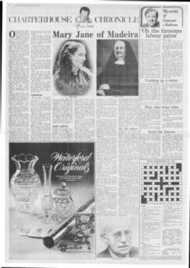Page 6, 26th October 1984
Page 6

Report an error
Noticed an error on this page?If you've noticed an error in this article please click here to report it.
Tags
Share
Related articles
King Leopold To Be Condemned?
King Leopold's Vindication Messages To British Army That...
King Leopold, A Model Catholic Monarch, Stands Revealed...
Off-beam Political Biography
Leopold In Unique Position
Rehabilitating Leopold
Outrageous Fortune: The Tradedy of Leopold III of the Belgians, by Roger Keyes, (Secker & Warburg, £15.00).
ALL THAT most English readers will remember about King Leopold III is that he is supposed to have stabbed his British ally in the back in 1940, this oountry's hour of greatest need.
What further aggravated his offence in the eyes of many contemporaries who, in wartime, could only go by what the censors allowed them to know, was that Britain had to some extent gone to war on 1914 for the sake of Belgian neutrality. Leopold's father, King Albert, then gave an unparalleled example of integrity, fortitude and courage, one of the few leaders in that first world war to emerge with his reputation greatly enhanced. The contrast was too obvious for even the meanest propagandist to miss — and some of them were very mean indeed, in every sense of the word.
Roger Keyes has set about putting the record straight. He is highly qualified to do so. His father was a very distinguished British naval officer who, during the 1914-18 war. led the operation that blocked the main German submarine base on the Belgian coast at Zeebrugge. During the second world war, he contributed not a little to bringing down Neville Chamberlain's government and acted as Churchill's personal representative with King Leopold before becoming the founder of the Commandos.
The author therefore had at his disposal his father's memories of the events concerned and a mass of hitherto unpublished material. Not content with this, he has clearly undertaken a major and very painstaking job of research into anything that might touch either on Leopold's personality or the details of Belgian politics — many of them sordid which affected his position.
Let it be said straightaway that Roger Keyes neither is, nor pretends to be, unbiased. In so far as he is concerned, Leopold was a strong, wise and good man who became the victim of a host of malevolent dwarfs, first among them Paul Reynaud, the French Prime Minister who ushered France into abject defect in 1940.
This takes nothing away from the merits of the present volume, since a thorough vindication of Leopold's part in the FrancoBritish response to Hitler's intentions in the West was long overdue. And it lends interest in advance to the second volume of this biography, yet to be published, which will deal with the further troubles of the king as a prisoner of the Germans, his second marraige and the events that led to his abdication in 1951, when his wisdom and handling of events appeared much more questionable.
Be that as it may, the first part of the story, up to the surrender of the Belgian army after a heroic — and, to many contemporaries, wholly astonishing — resistance to devastatingly overwhelming odds, does not make pretty reading in terms of either the rectitude of the French and British never mind the German authorities or of their military competence: the Belgians, for instance, were still fighting a day and half after the British evacuation at Dunkirk had begun, because nobody had bothered to tell them that their war was over for the time being.
That was bad enough. What was far worse from a Belgian point of view was that the French badly needed some scapegoat to justify their disintegration, and found that the Belgians, with Leopold at their head, provided a cast-iron excuse. That cry was taken up in Britain and — just one example among many — Lord Dunsany published a lampoon alluding to the car crash in which Queen Astrid, Leopold's beautiful Swedish wife, was killed when he was at the wheel:
Poor foolish king, why deemed we in our strife.
And yet when all is said, and justice has been done to Leopold, who did his able best to keep his country out of the war while there was yet a chance to do so. led his army brilliantly when the time came and chose to share his country's captivity when it had been crushed, a sense of inevitable doom hovers over the entire story.
Leopold was a young man full of promise, endowed by nature with talents and a sense of responsibility beyond the ordinary, trained with care and forethought to be the leader of an undisciplined and divided people. He deserved to succeed, and in many ways did so, beyond all expectation. Yet in the end, fate closed in on him and deprived him of what he had come to regard as his purpose in life and his justification as a human being.
There is in his story the makings of a Greek tragedy.
blog comments powered by Disqus











